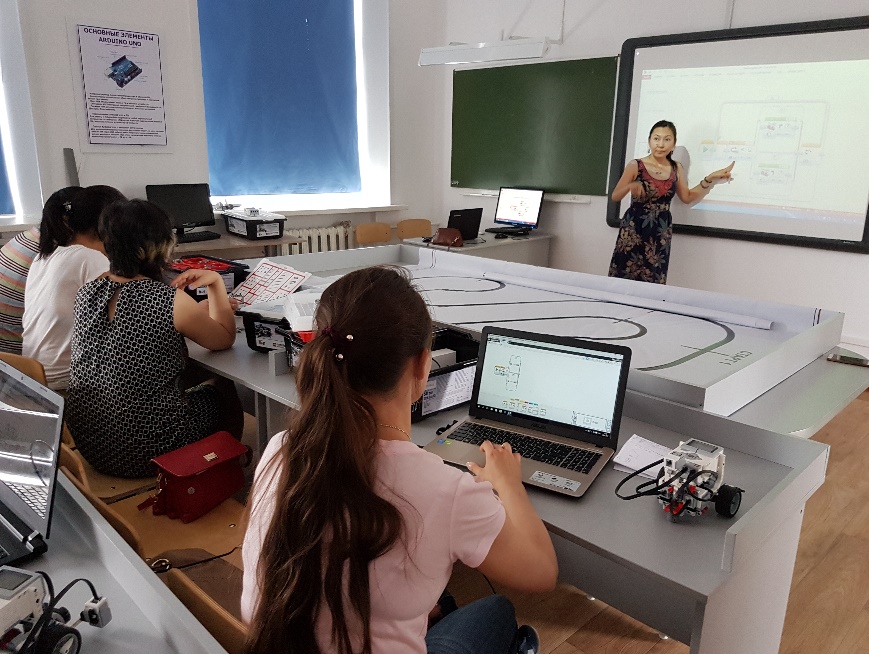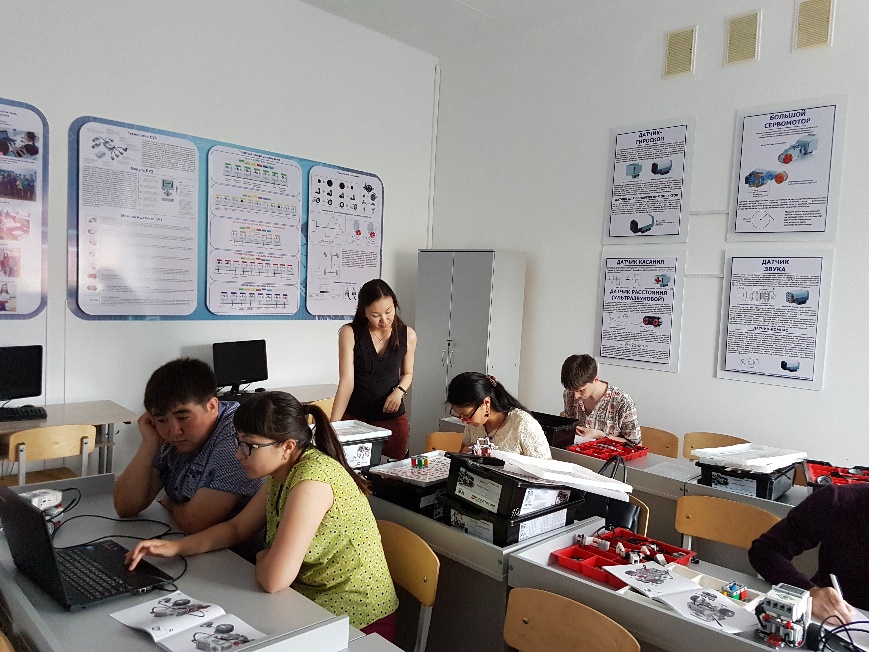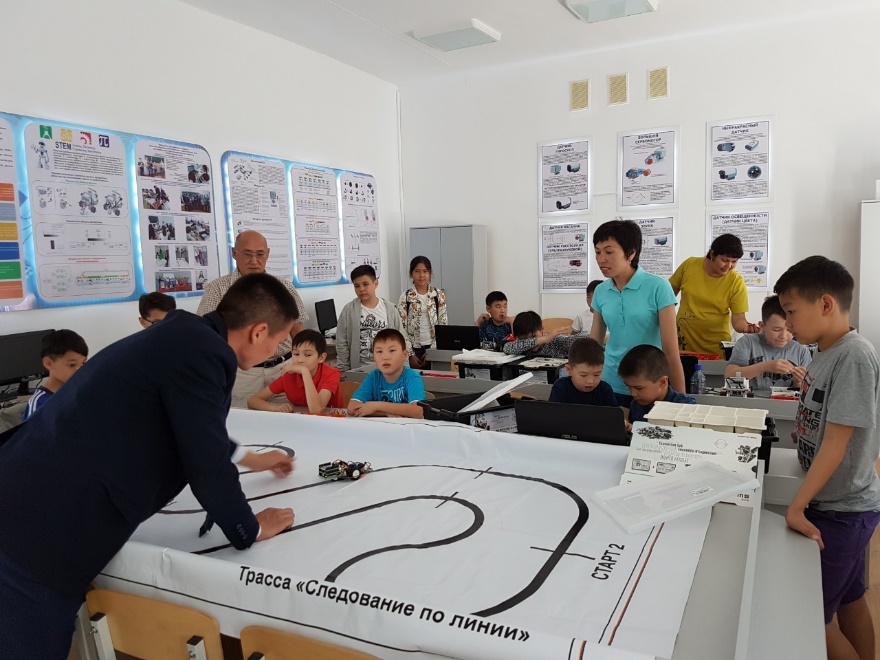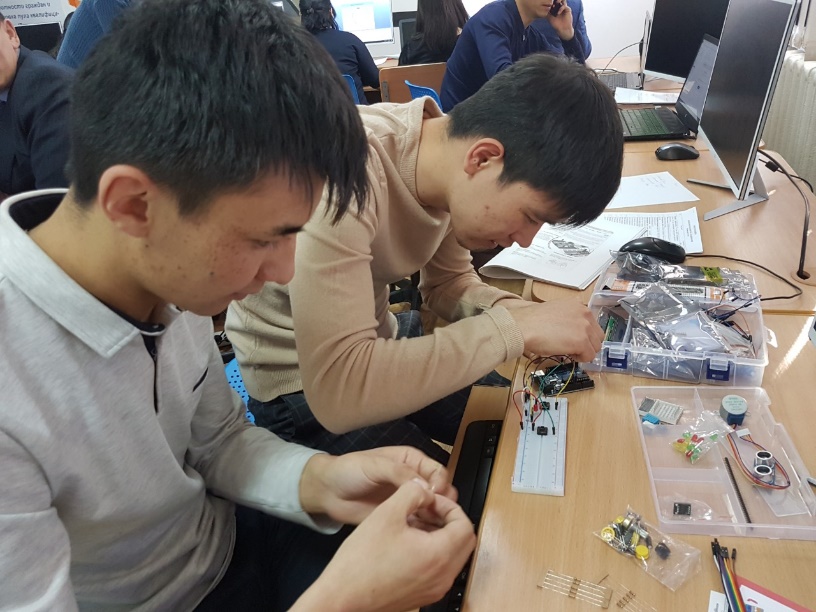History
Educational program
Educational program
6В01530 – Сomputer science
6В01532 – Сomputer science - Physics
6В01533 – Сomputer science -Mathematics
7М01531 – Сomputer science
8D01530 – Сomputer science
Education levels
Bachelor's degree:
- on the basis of general secondary education - full-time education, duration 4 years;
- on the basis of higher vocational education – full-time education, duration 2 years.
- on the basis of vocational education – dual form of education., duration 2 years;
- on the basis of higher vocational education – dual form of education, duration 2 years.
Master's degree (scientific and pedagogical direction)
- full-time education, duration 2 years.
Doctoral studies
- full-time education, duration 3 years.
Qualification
Educational program 6В01530 – Сomputer science:
awarded degree – bachelors of education in the educational program 6В01530 – Сomputer science; major qualifications. - teacher of computer science; an additional qualification Robotics teacher;
Educational program 6В01532 – Сomputer science - Physics
awarded degree – bachelors of education in the educational program 6В01532 – Сomputer science - Physics; major qualifications - teacher of computer science and phisics.
Educational program 6В01533 – Сomputer science - Mathematics:
awarded degree – bachelors of education in the educational program 6В01533 – Сomputer science - Mathematics; major qualifications - teacher of computer science and mathematics;
Educational program 7М01531 – Сomputer science (scientific and pedagogical direction)
awarded degree – master of pedagogical sciences 7М01531 – Сomputer science
Educational program 8D01530 – Сomputer science
doctor of philosophy (PhD) 8D01530 – Сomputer science
Head of the educational program
Head of the educational program– Yeltinova Raushan Amanzholovna
E-mail: yeltinova_raushan@ppu.edu.kz
work phone 8(7182)65-16-27, (internal telephone number) 309
General information about teaching staff
The teaching staff of the faculty Ph.D.Sabirov Т.S., Ph.D.Asambayev А.Zh., PhD Kabenov D.I., PhD Muhamedieva К.М., Аbykenova D.B., masters Kusmanov К.R., Taichik Zh.Е., Saifurova I.О., Beissenova S.B., Omar К.Қ.
The History of the EP of "Computer Science"
In developing the educational program (EP) of "Computer science", "Information technologies in education", the disciplines of general education, basic and major cycles are studied. The total number of courses offered within the academic year of 2020–2021 is 20 bachelors’, 10 master's courses, 5 courses in English. EP of "Computer science" is aimed at forming the professional competence of future specialists, corresponding to the qualification framework of levels of education and professional standards, as well as meeting the needs of the market. The block of major disciplines covers the necessary areas of scientific knowledge for the formation of professional competencies. The disciplines included into the modules adequately reflect the specifics of this specialty and allow students to acquire knowledge, skills, and abilities in professional activities.

The teaching staff of the EP of “Computer science” actively participate and deliver reports at scientific and practical conferences. They are published in scientific journals, indexed by the Thomson Reuters database, Scopus and the Higher Attestation Commission, develop teaching aids, electronic teaching aids and digital educational resources, receive certificates of state registration of intellectual property objects.
Teachers of the EP of "Computer science" actively cooperate with various research institutes and laboratories both in Kazakhstan and abroad, which result in scientific internships.
Involvement of foreign consultants in the implementation of the EP of "Computer science" The teaching staff of the EP passed research internships in the following foreign universities:
- the University of Sussex. Brighton, England;
- the Belarusian State University of Informatics and Radioelectronics, Minsk, Republic of Belarus;

- the State University of Navarra, Pamplona, Spain;
- the University of Economics of Bratislava, Slovak Republic;
- the National Inter-University Consortium for Telecommunications, Italy.
In order to implement the main parameters of the Bologna process in the NJSC Pavlodar Pedagogical University there is a modular-credit system of education, within its framework, the university implements an academic mobility program. External academic mobility took place in the following foreign universities:
- Varna University of Management, Dobrich, Bulgaria;
- Vytautas Magnus University, Kaunas, Lithuania.
Prospects of the EP of "Computer science", "Information Technologies in Education" are associated with:
- an increase in courses in English (in order to expand the communicative and linguistic competencies of our students);
- modernization of courses and regular updating of educational programs;
- regular advanced training of scientific and pedagogical personnel;
- an increase in the number of scientific projects implemented at the expense of scientific funds;
- an increase in the number of publications indexed in the RSCI / Wos / Scopus databases.
The staff of the EP of "Computer science" is actively engaged in scientific work, as evidenced by the active participation of the teaching staff of the EP of "Computer scince" in grant-funded research projects.

At the disposal of students, undergraduates and teachers of the EP of «Computer science» there are educational and research laboratories with access to the Internet, there are also personal computers for the teaching staff of the department with the Internet access.
Two specialized educational and research laboratories are assigned to the EP of «Computer science»: laboratory of robotics and computer systems (No. 5-404), laboratory of STEM education (No. 1-325). The classrooms are equipped with modern educational furniture, computer equipment, traditional and multimedia boards, stands, laboratory equipment, and display stands.
EP of «Computer science» graduates will be able to work as:

- a teacher of computer science in secondary school, as well as a teacher of computer science, information and communication technologies (in English) and related disciplines in colleges, secondary vocational schools, etc .;
- a system administrator;
- a programmer in the IT field.
.png)